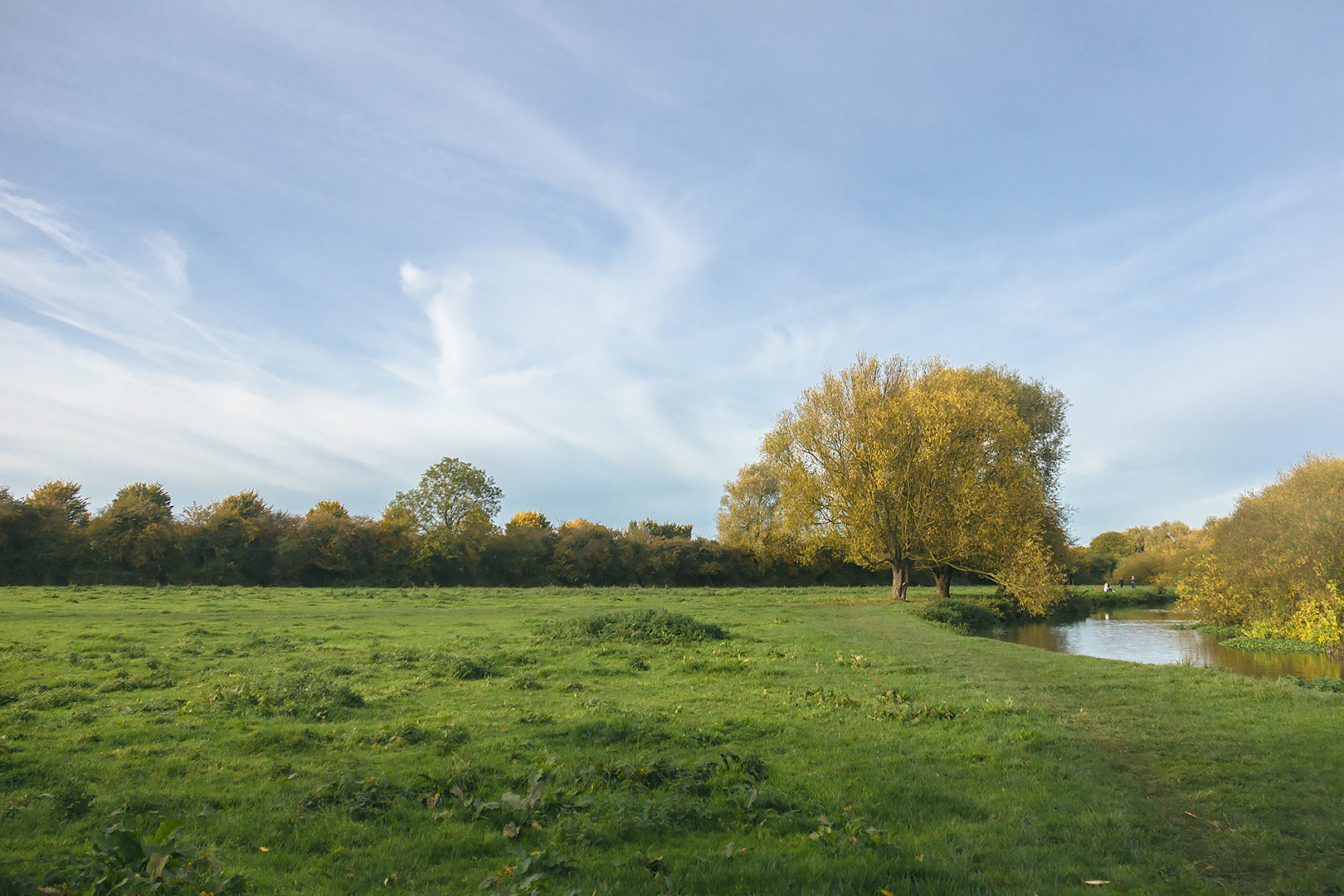Grantchester Meadows
Just outside Cambridge, the river Cam flows south westerly to the little town of Grantchester via Grantchester Meadows. You can walk from this short route from Cambridge through the meadows to Grantchester. Granchester has a history of it’s own. It claims to have the worlds highest concentration of Nobel Prize winners. More significant are small connections to names from Byron to David Gilmor of Pink Floyd. Gilmore once penned a song called, Grantchester Meadows.
Just outside Grantchester itself, and on the way to Cambridge, is a charming little tearoom called The Orchard. The Orchard lies in a lovely apple orchard, a short walk from the meadows. There seems to have possibly been some effort to clean up the more interesting details of this place. I could swear The Orchard website and Wikipedia previously supplied much more information. It all seems quite limited and tame now, but I must be wrong. The current website simply says lots of famous people have had tea there, listing names like Woolf, Russell, Hawking, and even Prince Charles. That’s NOT what makes this place fascinating.
It was opened simply enough when a group of students asked the owner of the orchard to serve them tea under the apple trees. Within a number of years it became an intellectual bohemian haunt for a very liberated group of thinkers. What became known as the Grantchester Neo-Pagans was composed of Rupert Brooke, Ludwig Wittgenstein, Bertrand Russell, Virginia Woolf, E M Forster, John Maynard Keynes, and Augustus Johns. They would sit together with other guests and discuss very un-Victorian and un-Edwardian thoughts and ideas. Can you imagine those conversations with those minds?
Augustus John lived there for a bit and ‘camped in Grantchester meadows with, as Keynes put it, his two wives and ten naked children; Brooke and Virginia Woolf (who dubbed his friends the Neo-Pagans) swam naked by moonlight; EM Foster visited the Orchard; Wittgenstein would come there by canoe; A N Whitehead and Bertrand Russell worked on their Principia Mathematica at the Mill House, next to the Old Vicarage.’ [1]
They called themselves Neo-Pagans, but this was not a formal name or group. Brooke wrote: ‘I am in the Country in Arcadia; a rustic… In the intervals I wander about bare foot and almost naked, surveying nature with a calm eye. I do not pretend to understand nature, but I get on very well with her… and we’re both very tolerant.’
Keynes, the famous economist said, ‘Camping life suits me well. The hard ground, a morning bath, the absence of flesh food, and no chairs don’t make one nearly so ill as one would suppose.’
Perhaps most apt at the time of this writing, Russel said about the coming first World War:
‘I am feeling the weight of the war much more since I came back here — one is made so terribly aware of the waste when one is here…
…I don’t live for human happiness, but for some kind of struggling emergence of mind. And here, at most times, that is being helped on — and what has been done is given to new generations, who travel on from where we have stopped. And now it is all arrested, and no one knows if it will start again at anything like the point where it stopped. And all the elderly apostates are over-joyed.’
The place is still lovely and you can have tea outdoors under the apple trees. In the autumn you are free to pick the apples from the trees and eat them right there. Yet ‘proper’ civilisation has also intruded. The Grantchester Neo-Pagans are now usually called The Grantchester Group, a significant loss of meaning. Little of the info above and below is available on the Orchard’s website, though some of the quotes above were found posted on the grounds. When you enter from the meadows you get a lovely, stern sign warning that this is private property with no right-of way, or something of the sort. Can you imagine what the friends would have thought of that? There’s also a sign by the river warning of no swimming. Presumably for safety’s sake? Perhaps also for prudence’s sake, I’m not sure. Never-the-less you should visit, if only to speak to the ghosts of the past. They helped preserve and push forward the civilisation and liberality they were fearful would perish. Perhaps we can too?
https://en.wikipedia.org/wiki/Cambridge
https://en.wikipedia.org/wiki/Grantchester
https://en.wikipedia.org/wiki/The_Orchard_(tea_room)
http://www.theorchardteagarden.co.uk/history/
http://www.independent.co.uk/life-style/yes-rupert-theres-still-honey-for-tea-1244687.html
http://chrishillhistory.tumblr.com/post/28981101295/rupert-brooke-and-the-neo-pagans
http://www.lrb.co.uk/v38/n20/jean-mcnicol/something-rather-scandalous
 James Lawton
James Lawton